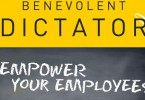When you’ve got rotten employees, what should you do? In this IndustryWeek interview with Michael Feuer, you’ll learn how to deal with those people. Click here for the original article.
How to Manage Rotten Employees
When difficult employees are poor performers, you send them packing. The real dilemma is when the bad apples are irreplaceable.
June 29, 2011
Michael Feuer, co-founder and former CEO of OfficeMax, has learned many lessons about dealing with difficult employees. One of them is there’s no need to waste your time with difficult personalities who also are lousy workers.
“It’s best to let them know straightaway that they aren’t a good fit for your organization,” says Feuer, author of the new book “The Benevolent Dictator: Empower Your Employees, Build Your Business and Outwit the Competition.”
The real conundrum, Feuer says, is when the difficult employees “are terrific and get the job done.” It’s even worse when everyone — including you — believes the rotten apples are irreplaceable.
In his new book, Feuer concludes that a leader is most likely to succeed when his or her management style resembles that of a benevolent dictator.
The “dictator” side of you calls the shots and makes the difficult decisions, but your “benevolent” side does so while putting the interests of the organization, your team and your customers ahead of your own.
This means reining in your hard-to-handle employees while still developing their talents, Feuer says.
“Once you identify an employee who is good, but whose personality or habits might present a problem, you have two choices,” Feuer says. “You can simply get rid of the troublesome employee and risk the consequences of lost productivity. Or you can take the more profitable route and find a way for peaceful coexistence by learning how to deal with the performer’s shortcomings while taking advantage of his or her strengths.”
Michael Feuer, co-founder and former CEO of OfficeMax, has learned many lessons about dealing with difficult employees. One of them is there’s no need to waste your time with difficult personalities who also are lousy workers.
“It’s best to let them know straightaway that they aren’t a good fit for your organization,” says Feuer, author of the new book “The Benevolent Dictator: Empower Your Employees, Build Your Business and Outwit the Competition.”
The real conundrum, Feuer says, is when the difficult employees “are terrific and get the job done.” It’s even worse when everyone — including you — believes the rotten apples are irreplaceable.
In his new book, Feuer concludes that a leader is most likely to succeed when his or her management style resembles that of a benevolent dictator.
The “dictator” side of you calls the shots and makes the difficult decisions, but your “benevolent” side does so while putting the interests of the organization, your team and your customers ahead of your own.
This means reining in your hard-to-handle employees while still developing their talents, Feuer says.
“Once you identify an employee who is good, but whose personality or habits might present a problem, you have two choices,” Feuer says. “You can simply get rid of the troublesome employee and risk the consequences of lost productivity. Or you can take the more profitable route and find a way for peaceful coexistence by learning how to deal with the performer’s shortcomings while taking advantage of his or her strengths.”




